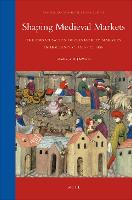Shaping Medieval Markets
The Organisation of Commodity Markets in Holland, c. 1200 - c. 1450
Author(s)
Dijkman, Jessica
Collection
OAPEN-NLLanguage
EnglishAbstract
The late Middle Ages witnessed the transformation of the county of Holland from a peripheral agrarian region to a highly commercialised and urbanised one. This book examines how the organisation of commodity markets contributed to this remarkable development. Comparing Holland to England and Flanders, the book shows that Holland’s specific history of reclamation and settlement had given rise to a favourable balance of powers between state, nobility, towns and rural communities that reduced opportunities for rent-seeking and favoured the rise of efficient markets. This allowed burghers, peasants and fishermen to take full advantage of new opportunities presented by changing economic and ecological circumstances in the late fourteenth and early fifteenth centuries.
Keywords
economic history; markets; holland; middle ages; institutions; instituten; economische geschiedenis; middeleeuwen; markten; Dordrecht; England; FlandersDOI
10.1163/ej.9789004201484.i-447ISBN
9789004201491OCN
808385391Publisher
BrillPublisher website
https://brill.com/Publication date and place
Leiden - Boston, 2011Imprint
BrillSeries
Global Economic History Series, 8Classification
Netherlands
History and Archaeology
CE period up to c 1500
Economic history


 Download
Download Web Shop
Web Shop